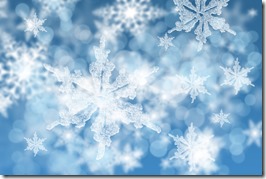
Why God Hates Sameness
 “Nature abhors a vacuum.” Or so we’ve been told. I read somewhere recently—I honestly can’t remember where—that some physicists or astronomists or quantum theorists or some other kind of -ists are questioning the foundation of that very firm law of the universe.
“Nature abhors a vacuum.” Or so we’ve been told. I read somewhere recently—I honestly can’t remember where—that some physicists or astronomists or quantum theorists or some other kind of -ists are questioning the foundation of that very firm law of the universe.
But I don’t understand much of what I read by those people.
I understand this though: nature sure seems to abhor sameness.
 Think about it: back in 2010 Snowmaggedon dumped 25-30 inches of snow over a region stretching up and down the east coast. All those feet of snow composed of individual snowflakes, and apparently no two snowflakes are the same! I don’t know how one would verify such a thing, but still, even if two snowflakes in two-trillion were identical, that’s still only 2 in 2 trillion! That is tremendous variety—it’s heterogeneity on an epic scale!
Think about it: back in 2010 Snowmaggedon dumped 25-30 inches of snow over a region stretching up and down the east coast. All those feet of snow composed of individual snowflakes, and apparently no two snowflakes are the same! I don’t know how one would verify such a thing, but still, even if two snowflakes in two-trillion were identical, that’s still only 2 in 2 trillion! That is tremendous variety—it’s heterogeneity on an epic scale!
Nature loves variety, if for no other reason than that variety is needed for survival. Those organisms that reproduce asexually i.e. by a single organism dividing to form two that share the exact same genetic material, are extremely vulnerable. When attacked by a virus to which they are vulnerable, the only protection their species has is isolation. If all the members of the species are in close proximity, the virus won’t stop until the entire species is extinct.
The advantage of sexual reproduction, is the genetic variety that result when two parents contribute two different sets of genes. When a virus or plague hits a species, those who are genetically similar are very susceptible, but those whose genes are different enough to be resistant to the virus or plague survive to reproduce resistant offspring—and the species continues.
Thus the Black Plague wiped out millions in Europe, but there were some who got deathly sick but didn’t die. And some who got a little sick and recovered. And some who didn’t get sick at all. Once all the vulnerable had died, the plague ran out. Sameness lost, variety won.
That’s how it works in nature. Nature rewards variety and resists uniformity. If you believe in God, of course, then it’s not just nature that prefers variety—it’s God himself. He surrounds himself with variety. All creation bears testimony to his love of things that are wild and different, wonderfully strange and even grotesque.
That’s how he made us. “Male and female he created them.”
Seriously, can there be two more different creatures than the human male and the human female?
But he didn’t just make us male and female. Once the genetic-variety machine got cranked up we started having dark-skinned humans and red-haired, fair-skinned, freckle-faced humans. Humans with blue eyes and humans with oval eyes and humans long legs and humans with narrow hips. Humans built like flag poles and humans built like fire hydrants.
Humans who speak completely different languages and humans who speak different versions of the same language. Some who say, “Ya’ll” and “All ya’ll” and some who say, “Yous guys.” Seriously, “Yous guys”?
One of the results of Sin is that we have a tendency to resist human variety and trust homogeneity. When we get afraid or angry we tend to hunker down with people like ourselves, and typically the results are terrible. Caucasian Americans segregated the descendants of former slaves “to protect our women and children” but really to protect their preeminence in society. Blond-haired, blue-eyed Germans tried and almost succeeded in wiping out the Jews in Europe. In fact, almost all episodes of genocide are the result of this gathering and protecting of sameness.
After the Babylonian exile Israel hunkered down in sameness, and Jesus fought against the resulting mess. The Book of Acts is the early church learning to trust what is naturally true—that we are better and stronger when we embrace the natural diversity in which God created us.
We are still learning to trust it.
Photos by © Can Stock Photo Inc. / Stocksolutions © Can Stock Photo Inc. / rajeshbac
 I am a lifelong student of the Bible, and have been a pastor for over twenty-five years. My desire through this blog is to help people see things in the intersection of Scripture and real life that they might have missed. The careless handling of the Bible is causing a lot of problems in our churches and our culture--and is literally turning people away from the church, and, sometimes, God. I hope to treat Scripture with the respect it deserves, and, even if you don't agree with what I say, give you some insight.
Feel free to leave a comment. I promise to respond to you. All I ask is that you be respectful in your comments.
I am a lifelong student of the Bible, and have been a pastor for over twenty-five years. My desire through this blog is to help people see things in the intersection of Scripture and real life that they might have missed. The careless handling of the Bible is causing a lot of problems in our churches and our culture--and is literally turning people away from the church, and, sometimes, God. I hope to treat Scripture with the respect it deserves, and, even if you don't agree with what I say, give you some insight.
Feel free to leave a comment. I promise to respond to you. All I ask is that you be respectful in your comments. 
Connect with Me